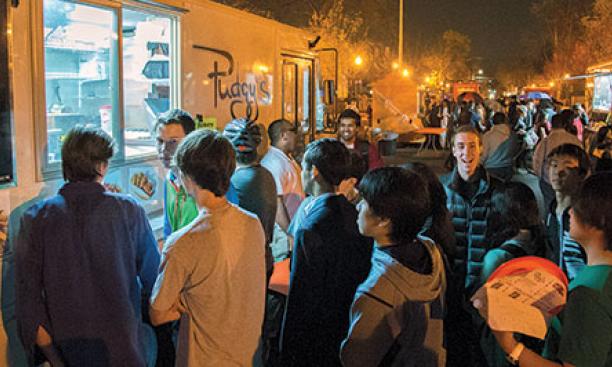
Eight faculty members, with 204 years of teaching at Princeton among them, are moving to emeritus status this year. The number stands in sharp contrast with 2013, when 32 retired, many as a result of the University’s 2010 retirement-incentive program. This year’s list:
- KWAME ANTHONY APPIAH, philosophy, 12 years on the faculty;
- ROBERT BAGLEY, art and archaeology, 29 years;
- MICHAEL BENDER, geosciences, 17 years;
- WILLIAM HAPPER *64, physics, 34 years;
- GILLIAN KNAPP, astrophysical sciences, 34 years;
- PAUL LANSKY *73, music, 45 years;
- LARRY PETERSON, computer science, 16 years;
- ALEJANDRO PORTES, sociology, 17 years.
TOBIAS KIM ’17, a member of the swimming and diving team from Richardson, Texas, died April 25 in Argentina. A University spokesman said Kim was not enrolled at the time and that his death was reported to be accidental. “Toby was a terrific young man with a great energy about him,” said head swim coach Rob Orr.

The eating clubs hosted the first PRINCETON TRUCKFEST, a food festival billed as “the alternative Prospect 11.” The April 25 event raised more than $20,000 for charities that fight hunger in Mercer County.
The University reached an agreement with the town of Princeton to pay $21.72 million in VOLUNTARY CONTRIBUTIONS over seven years, plus $2.59 million for several municipal projects. This year’s contribution will be $2.75 million, and each subsequent year the amount will increase by 4 percent. Negotiations “were conducted in an atmosphere of mutual respect and an understanding of the shared interests of the University and the town,” said Princeton council president Bernie Miller.

IN MEMORIAM: Professor emeritus PAUL SIGMUND, a member of the politics department faculty from 1963 to 2005 and former director of the Program in Latin American Studies, which he helped to establish, died April 27 in Princeton from complications of pneumonia. He was 85.
Sigmund wrote, edited, or translated 19 books in two fields, political theory and Latin American politics. He was a “seasoned observer of Latin American political development going back to the early 1960s,” said Professor Jeremy Adelman. Sigmund lectured in nearly every Latin American country, and was a visiting professor at the University of Chile and the Catholic University in Santiago.
A devout Roman Catholic, he espoused the liberation-theology movement and had a long relationship with Princeton’s Aquinas Institute.
